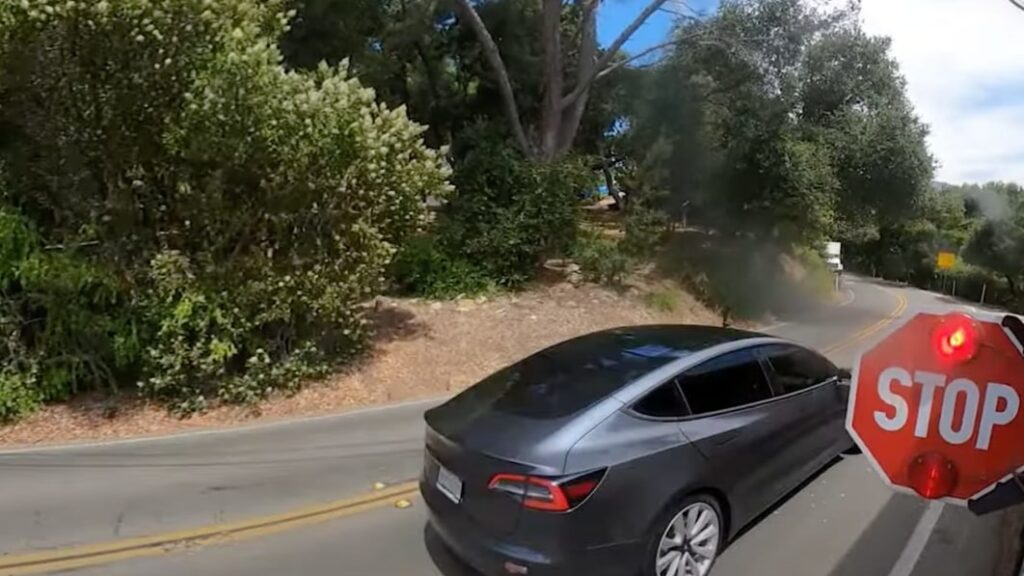Tesla didn't run a Super Bowl ad. But a tech CEO calling for a boycott of the carmaker did

The Dawn Project ran a Super Bowl ad.Courtesy of the Dawn Project
The Dawn Project aired anti-Tesla Super Bowl ads for the second consecutive year.
The ads alleged Tesla’s driver-assist feature caused accidents and urged viewers to boycott.
The Dawn Project was founded by Dan O’Dowd, who runs a competing software company.
Tesla may not be running Super Bowl ads yet, but an organization run by another tech CEO called for boycotts with commercials during the big game.
For the second year running, The Dawn Project ran Super Bowl commercials on Sunday night that the organization said included footage of Tesla crashes where the company’s driver assist feature was allegedly in use.
One of the ads shows two clips: a Tesla hitting a truck at an intersection and another Tesla failing to stop at a stop sign and hitting a parked car.
The other ad alludes to an accident where a “self-driving” Tesla failed to stop for a school bus and put “a child on a ventilator with a fractured neck and broken leg,” according to the video.
The video appears to be referencing an accident from last year when a 10th-grade student from North Carolina was hit by a Tesla.
In April, local news reported the National Highway Traffic and Safety Administration was investigating whether Autopilot had been in use during the incident.
“Tesla must be held accountable,” one of the 30-second ads says. “Boycott Tesla to keep your family safe.”
Tesla did not respond to a request for comment ahead of publication.
The carmaker has been hesitant to advertise in the past, relying primarily on Musk to promote the brand.
Last year, the Tesla CEO said the company would try its hand at advertising for the first time in the company’s history, but Tesla’s commercials have yet to make it to the Super Bowl, where slots can cost millions of dollars.
A spokesperson for The Dawn Project said the organization spent $552,000 on the Super Bowl ads this year.
Last year, the organization — which claims its mission is to ban “unsafe software” — ran a Super Bowl ad showing a Tesla, which it says was using Tesla’s driver-assist add-on Full Self-Driving, running over a child-sized dummy.
“When you buy a new Tesla you are financing and enabling Elon Musk to put a dangerous, unfinished, product on our public roads,” The Dawn Project founder Dan O’Dowd told Business Insider in an emailed statement. “Through numerous nationwide TV commercials, including at last year’s Super Bowl, five full-page ads in the New York Times, and online advertising, we have tried to pressure Tesla and Elon Musk to do the right thing and take their defective software off our roads. However, it seems that the only thing that will pressure Tesla and Elon Musk to do the right thing is to deny them your money.”
It’s far from the first time O’Dowd has taken aim at Tesla and Musk. In 2022, O’Dowd unsuccessfully attempted to run for Senate on a platform based solely on banning Tesla’s Autopilot and FSD features.
He also ran an ad in The New York Times slamming Tesla. That year, Tesla threatened to sue O’Dowd and Musk called him “crazy” on social media.
Notably, O’Dowd is the CEO of Green Hills Software, a private company that has worked with companies on its own automated driving systems, among other software projects.
The NHTSA has been investigating Tesla’s driver assist features and the company launched an over-the-air update in February to address some concerns about FSD.
Tesla’s Autopilot feature can be used to guide the vehicle on the highway, including handling lane changes and exits, while FSD operates as an optional $12,000 or $199 per month add-on that can operate in more urban settings, including by changing lanes, recognizing stop signs and traffic lights, as well as parking.
The carmaker has said both services are still in beta testing mode and require a licensed driver to monitor it at all times.



